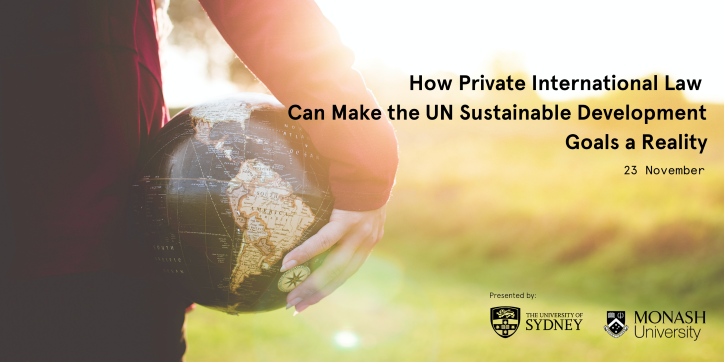
How Private International Law Can Make the UN Sustainable Development Goals a Reality
How Private International Law Can Make the UN Sustainable Development Goals a Reality
The clock is ticking. We have until 2030 to implement the UN’s 17 Sustainable Development Goals if we are to achieve a “better and more sustainable future for all.”
Law plays a crucial role in reaching ambitious goals such as ‘No Poverty’ (SDG #1), ‘Affordable and Clean Energy’ (#7) and ‘Climate Action’ (#13). But until now, the role of law in achieving the Sustainable Development Goals has been limited to public international law and relations between nations. Missing from the commentary has been the vital role to be played by private law, particularly private international law, which is essential for the implementation of cross-border contracts and the resolution of cross-border disputes.
An exciting new project brings together a team of legal experts from around the world to demonstrate how private international law can make each Sustainable Development Goal a reality.
Join some of these pioneering legal minds as they discuss the results of their research and the path ahead for our world.
Order of proceedings
1. Introduction to the SDGs and the project
Professor Verónica Ruiz Abou-Nigm and Mr Hans Van Loon
These presentations will address the sustainable development goals, the interaction of and issues presented by private international law, and the objectives and recommendations of the project.
2. SDG 9: Industry, Innovation and Infrastructure
Professor Vivienne Bath
This presentation will address the impact on, and interaction of private international law with, the construction and operation of sustainable infrastructure and the potential role of regulatory private international law.
3. SDG 15: Life on Land
Dr Drossos Stamboulakis
This presentation considers the global governance role that private international law can, and arguable should, play in achieving SDG 15 through the facilitation and incentivization of private action geared at environmental protection and sustainability. Chapter written by Dr Stamboulakis and Professor Jay Sanderson.
Chair
Associate Professor Stacie Strong
Speakers
Professor Verónica Ruiz Abou-Nigm is Senior Lecturer in International Private Law at Edinburgh Law School. Professionally qualified as a solicitor in Uruguay, with extensive practice in international litigation, her research focuses on the intersections between private international law and various other disciplines, within and beyond law, including maritime law and migration studies. Her scholarship promotes the transnational mobilisation of private international law, developing knowledge in which private international law can foster intercultural integration, contributing to accommodate different legal traditions and cultures in cross-border cases.
Mr Hans Van Loon is an independent international consultant. He is a member and vice-president of the Institut de droit international. He practiced as a lawyer before the Supreme Court of the Netherlands and the European Court of Human Rights, and was as a deputy judge in the Hague District Court. He joined the secretariat of the Hague Conference on Private International Law in 1978, being appointed also as Secretary of the Netherlands Government Committee on Private International Law, and was the HCCH’s Secretary General from 1996-2913. He contributed to the creation of a dozen Hague Conventions on private international law and to the amendment of its Statute to enable Membership of the European Union, and is a member of the European Group for Private International Law.
Professor Vivienne Bath is Professor of Chinese and International Business Law in the University of Sydney and Associate Director – International of the Centre for Asian and Pacific Law at the University of Sydney. She is also a Senior Research Fellow of the Asia IP and Technology Law Project at the University of California, Berkeley, School of Law. Her teaching and research interests are in international business and economic law, private international law and Chinese law. She also has extensive professional experience in Sydney, New York and Hong Kong, specialising in international commercial law, with a focus on foreign investment and commercial transactions in China and the Asian region.
Dr Drossos Stamboulakis is Lecturer at Monash University, and is admitted to practice as an Australian Lawyer. He is the Deputy Convenor of Monash’s Commercial Disputes Group, and coaches the Monash Vis International Commercial Arbitration Moot team. His research spans commercial arbitration, comparative law and private international law, and intersections with biodiversity and sustainability.
Professor Jay Sanderson is an interdisciplinary scholar with degrees in law, science and psychology. He is currently Professor and Head of School of USC’s School of Law and Society. Jay’s main areas of research focus on the social and doctrinal developments of laws related to plants, agriculture and biodiversity. He is currently working on projects that examine biodiversity and BioTrade; and the use of trademarks and certification.
Chair
Associate Professor Stacie Strong is an Associate Professor at Sydney Law School specialising in private international law, international arbitration, international mediation and comparative law. Stacie has taught at law schools around the world and has acted as a dual-qualified (England-US) practitioner with major international law firms in the UK and the US. She has also written over 130 award-winning books, articles and other works and has acted as an expert consultant to a variety of governmental, non-governmental and intergovernmental organisations.
Publication – access here:
Edited by Ralf Michaels, Verónica Ruiz Abou-Nigm and Hans van Loon
Event details
This free online event will be held on 23 November 2021, 6:00 PM – 7:30 PM AEDT
CPD Points: 1.5
This webinar is jointly presented by the Centre for Asian and Pacific Law and the Sydney Centre for International Law at the University of Sydney Law School, the Centre for Commercial Law & Regulatory Studies, Faculty of Law, Monash University, and the Monash Sustainable Development Institute.

Banner image credit: Ben White on Unsplash

